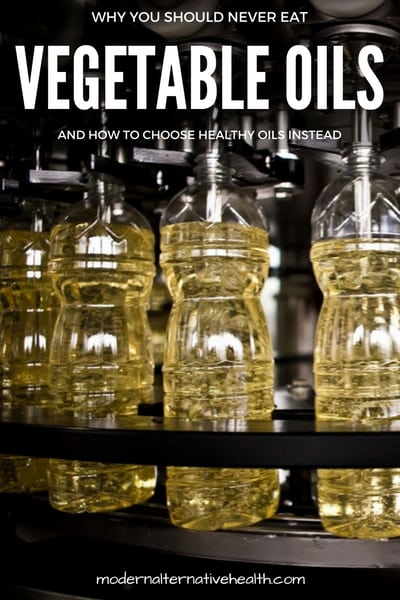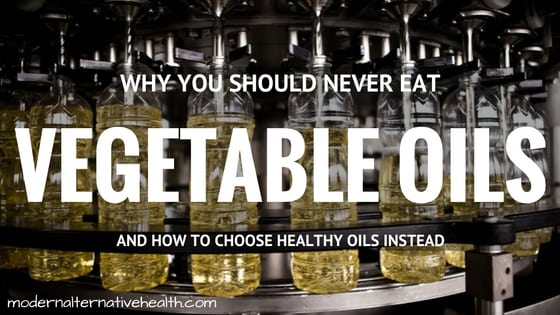We recently declared that lard is healthy, and if you’re new to whole foods eating, that may come as a shock. The fats we eat can have a huge impact on our health, for better or worse, and seeing as how many of our foods contain fat in some form, we should be paying attention to choosing healthy oils and fats. Contributor Jaclyn will help us get our fats straight.
Why Is It Important to Choose Healthy Oils?
If you eat at home often, you probably find yourself reaching for various oils and fats on a regular basis. Personally, I use some type of fat almost anytime I’m cooking or baking, for flavor, texture, and health.
Before I switched over to whole, real foods, I cooked fairly often, but I used vegetable oils, which really aren’t vegetable oils at all, as most are made from GMO corn and soy. Once I started learning how to truly nourish my family, vegetable oils were one of the first things to vacate my kitchen.
Choosing healthy oils became important to me because:
- I wanted to avoid oils that have been shown to cause cancer, obesity, diabetes, heart disease, and more; and
- I wanted to get the utmost nutrition I could into myself and my family. Using healthy oils helps me do that.
Why You Should Never Eat Vegetable Oils
Learning about healthy fats was one of the first things I did in my healthy living journey. I can remember being shocked when someone told me butter is a good fat. I thought “Yeah right! Fat makes you fat!” Funnily enough, the woman telling me this was thin and fit. That should’ve tipped me off that butter was not the villain it’s been made out to be.
When I really delved into avoiding harmful ingredients, I eliminated things like high fructose corn syrup, artificial coloring, monosodium glutamate, and trans fats and hydrogenated oils (read about the five ingredients you should never feed your family here).
I began reading about how hydrogenated oils and trans fats were the equivalent to your health as smoking: maybe they weren’t going to kill you today, but the cumulative effect of using them for years sure would. I didn’t want to feed my kids something that was as bad for them as cigarettes!
Vegetable Oils Are Associated With:
- heart disease
- cancer
- digestive abnormalities like IBS
- diabetes and metabolic disorders
- arthritis, asthma, and other autoimmune diseases
- obesity
The Skinny on Fats
The Standard American Diet has a surplus of some key unhealthy ingredients, while it lacks the foods we need to be properly nourished. Of course, that includes too many refined carbohydrates and sugars, a plethora of unhealthy additives, and omega 6 fats.
Why does this matter? Aren’t omega fats good for us? Yes, that’s why cod liver oil is good for you, BUT when the omega fats get out of balance, inflammation occurs. Vegetable oils are high in omega 6 fats, while they contain little to no omega 3s, causing an imbalance that encourages disease and inflammation.
Oils to Avoid:
- corn
- soy
- cottonseed
- sunflower/safflower (I know, a lot of healthier brands of snack foods contain these. We still eat them sometimes, but they are not ideal, though, at least more natural than the others.)
- canola
- peanut

How to Choose Healthy Oils
Instead of relying on oils that cause inflammation, let’s look at what we want to see in healthy oils, and how to choose them.
Healthy oils generally have a higher saturated fat content. Contrary to what you’ve heard, saturated fat is actually healthy and reduces risk of heart disease.
As I wrote in this post on why lard is healthy: “Once Crisco launched a smear campaign against traditional fats like lard, consumers began believing that healthy fat found in nature was inferior to man-made fats created in a lab. Health in the western world has declined steadily since.”
The only reason we believe traditional fats like lard and butter are unhealthy for us is because Crisco and other vegetable oil manufacturers created very clever ad campaigns and convinced our parents and grandparents that saturated fat was going to kill them. Instead, consumers’ health began declining as soon as these products were introduced.
Since we have wised up since then, we now look to the wisdom of our great-grandparents and beyond to determine which are truly healthy oils and fats to eat and cook with. Oils that haven’t been tampered with and promote healthy vitamin assimilation, better gut and brain health, and overall vibrancy include:
- butter (my personal favorite!) If you don’t tolerate it, try ghee.
- coconut oil
- lard
- beef or lamb tallow
- avocado oil (newly popular, this heart-healthy oil withstands high heat levels, unlike its liquid oil counterparts.)
- olive oil (best for cold preparations, like salad dressing.)
Not Sure How to Cook with Healthy Oils?
You’re in luck, because we’ve got a recipe archive chock full of healthy oils and fats!
Check out Tradishen, our simple meal planning site that makes getting healthy food on the table fast, easy, and uncomplicated. Instead of trying to figure out how to swap vegetable oils for healthy oils, let Tradishen take the guesswork out of planning healthy meals.
We offer a “Classic Clean” menu that contains whole grains, quality dairy, meat, eggs, fruits, and vegetables; “Paleo” which eliminates grains and dairy for those who are sensitive; and “Vegetarian” for those who don’t eat meat.
Once you’ve chosen your diet, Tradishen does the planning for you. You can make adjustments, such as servings, and even swap out meals. Once your menu plan is ready, you can shop from the plan to save time and money at the grocery store.
Never eat vegetable oils again. Make the switch to healthy oils and let Tradishen make the switch seamless for you.







[…] Next Best: Grapeseed oil is a healthier choice than say vegetable or canola oils, which are always rancid and denatured. Read more about Why You Should Never Eat Vegetable Oils. […]